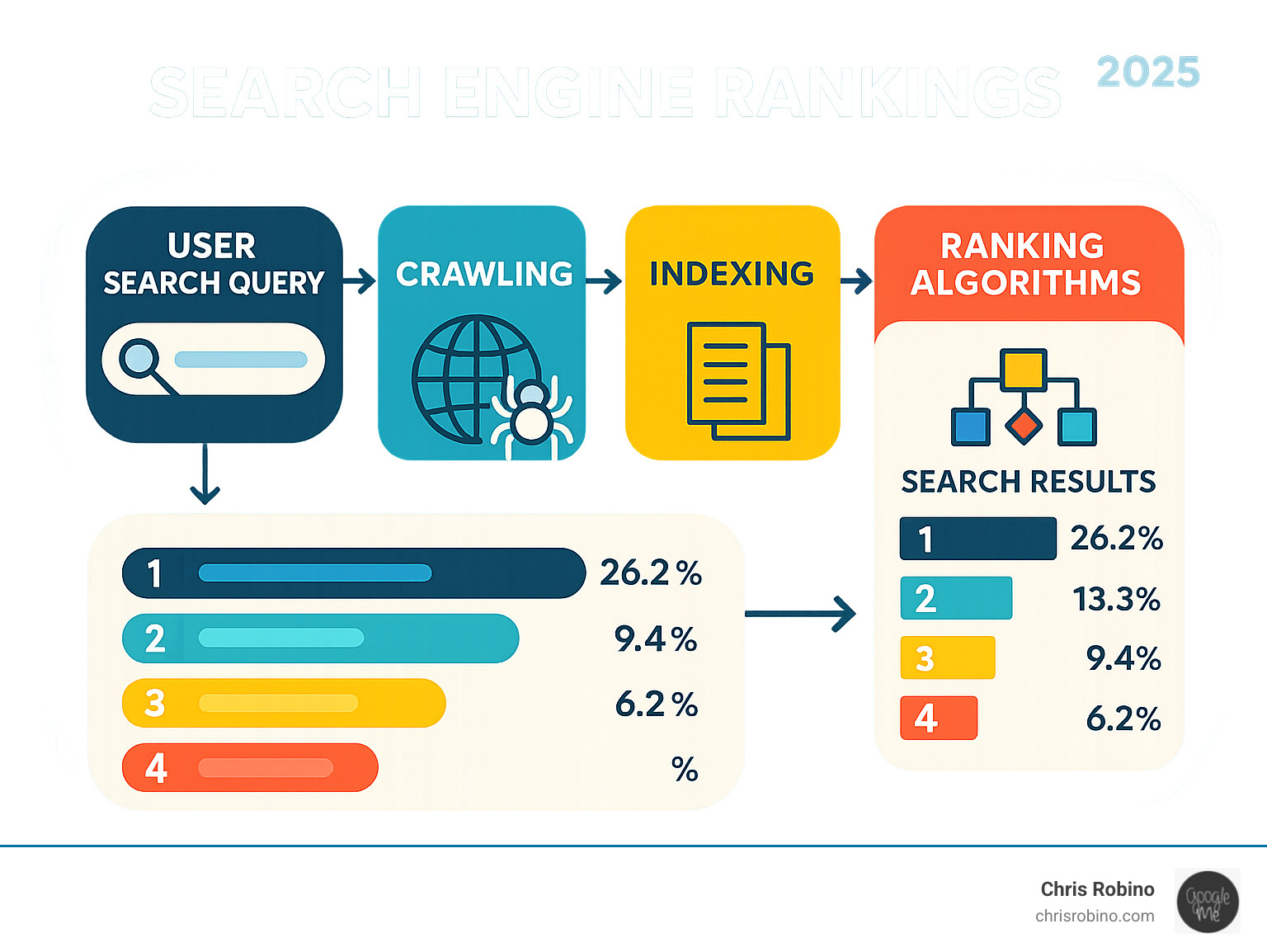Why Search Engine Rankings Determine Your Digital Success
Search engine rankings represent your website’s position in search results for relevant keywords. Understanding these rankings is crucial because they directly impact your visibility, traffic, and business growth.
Here’s why rankings are so critical:
- Top positions get most clicks: 75% of all clicks go to the top five results.
- First page is dominant: 97% of searchers never go past the first page.
- Rankings drive traffic: Higher positions generate exponentially more organic traffic.
- Rankings build trust: Users inherently trust higher-ranking results.
- Business impact: The #1 organic result has a 10x higher click-through rate than the #10 result.
Search engines like Google use complex algorithms with over 200 ranking factors—including content quality, site authority, and user experience—to determine top positions. These algorithms constantly evolve, with hundreds of changes per year. The reality is simple: if your website doesn’t rank well, potential customers won’t find you. With Google handling over 8.5 billion searches daily, mastering search engine rankings is essential for digital survival.
I’m Chris Robino, a Digital Strategy Leader and AI & Search Expert with over two decades of experience helping organizations transform their online performance through strategic search engine rankings optimization. I’ve guided companies from startups to established enterprises in using innovative SEO strategies that maximize ROI and drive sustainable growth.

What Are Search Engine Rankings and Why Are They Crucial?
Think of search engine rankings as your digital storefront’s location. Your ranking determines whether you’re in the prime window display or hidden where no one ventures. A search engine ranking is simply where your website appears for relevant search terms. Position one is the top of the page; anything beyond the first page is nearly invisible.
This isn’t just about vanity metrics. Higher search engine rankings directly translate into more organic traffic, which means increased brand awareness, more qualified leads, and higher conversion rates that impact your bottom line.
There’s also a psychological element. Users inherently trust websites at the top of search results. When your site consistently ranks high, it builds credibility and authority. If competitors claim those top spots, they’re capturing the lion’s share of attention and business in your market.
Understanding Your Current Search Engine Rankings
Before improving your search engine rankings, you must know where you stand. This means tracking keyword positions for terms your ideal customers search for. Monitor both impressions (how often your content appears) and clicks (how many people visit). The relationship between these numbers reveals your click-through rate, a key signal of relevance to search engines.

The top Google result enjoys a much higher click-through rate than lower results. Using search analytics tools helps you identify which keywords drive traffic and where to focus your optimization efforts. Performance tracking is an ongoing process, as rankings fluctuate. Regular monitoring allows you to spot trends and capitalize on new opportunities. For organizations seeking a comprehensive approach, our business consulting services can provide strategic guidance.
The Three Pillars of How Search Engines Work
Understanding how search engines work demystifies the search engine rankings process. It’s a system built on three core functions.
Crawling is the findy process. Search engine bots follow links to find new and updated content. A well-structured site with clear navigation is essential for effective crawling.
Indexing is the storage process. After crawling, search engines analyze and organize content in a massive digital library. A page must be indexed to appear in search results, so content must be understandable to search engines.
Ranking is the final step. When a user enters a query, algorithms sift through the index to find the best answer. Google’s algorithm considers over 200 factors, from content quality to mobile-friendliness. These algorithms are not static; Google makes hundreds of changes annually. Staying current with how search algorithms work is key to effective SEO. The shift to sophisticated, cloud-based systems has changed how search engines deliver results, a concept explored in Moving From Ops System To Browser Based To The Clouds.
Key Factors Influencing Your Search Engine Rankings
Think of search engine rankings like a recipe; your website needs multiple elements working together. There’s no single secret sauce. Search engines evaluate your site on multiple levels, looking at content quality, website trustworthiness, and user experience. You need to impress on all fronts.

The most influential factors fall into three areas: content quality, website authority, and user experience. Amazing content won’t help a slow site, and a fast site means nothing without relevant content. Let’s explore these crucial elements.
Content: The Foundation of High Rankings
Content is the foundation of SEO, but not all content is equal. Search engines are adept at distinguishing helpful content from filler. The gold standard is E-E-A-T: Experience, Expertise, Authoritativeness, and Trustworthiness. This framework helps Google surface the most reliable information. Ask yourself: “Do I have real experience or expertise on this topic?”
Content relevance is also crucial. Your content must match the user’s search intent perfectly. Originality and freshness are also important, as search engines reward new, valuable information. While there’s no magic word count, long-form content often performs better because it allows for more comprehensive topic coverage, as demonstrated in our analysis of Media Industry Trends 2024.
Authority: Building Trust with Links and Mentions
Digital authority is like a real-world reputation. When other respected websites link to you, these backlinks act as votes of confidence. Quality trumps quantity; a single link from a relevant, high-authority site is more valuable than dozens of low-quality links.
Domain authority reflects your site’s overall credibility. While not a direct ranking factor, the elements that build it—like high-quality backlinks and brand recognition—influence your search engine rankings. The best approach is natural link building: creating content so valuable that others want to reference it. This involves genuine relationship-building through digital PR and earning brand mentions. This process requires the patience and effort of The Hard Work. Avoid shortcuts like buying backlinks, as penalties can be severe.
Technical Health: Ensuring a Seamless User Experience
Brilliant content won’t succeed on a site with a frustrating user experience. Search engines prioritize sites that work well for users. Core Web Vitals are key metrics measuring real-user experience: Largest Contentful Paint (LCP) for loading, First Input Delay (FID) for interactivity, and Cumulative Layout Shift (CLS) for visual stability.
Mobile-friendliness is mandatory. With most searches on mobile, Google uses mobile-first indexing. Your site must function perfectly on all devices. Site speed is also critical; pages should load in under three seconds to retain visitors. This involves optimizing images and code. HTTPS security protects user data and is a confirmed ranking signal. Finally, a clean URL structure and logical site architecture help both users and search engines steer your content. For more on how technical excellence impacts business, see our Tech Industry Report.
Strategic SEO: Techniques to Improve Your Position
Improving search engine rankings requires a strategic plan where every decision moves you closer to the first page. Think of it as a digital roadmap.
Strategic SEO harmonizes on-page SEO, off-page SEO, and technical SEO. For large organizations, this scales into enterprise SEO, a sophisticated approach for managing vast digital properties. Our strategy begins with thorough keyword research to understand user intent, which then drives our content strategy.
On-Page and Technical Optimization
Strong search engine rankings start on your website. Every page is an opportunity to communicate clearly with users and search engines.
- Title tags: Your page’s headline in search results. Keep it compelling, under 60 characters, and include the target keyword.
- Meta descriptions: Your elevator pitch to users. A well-written summary of about 155 characters can improve click-through rates.
- Header tags: Use H1 for the main topic and H2-H6 for subtopics to create a logical, scannable structure.
- Internal linking: Create pathways within your site to distribute authority and guide users to related content.
- Image optimization: Use descriptive filenames and alt text for accessibility and context. Compress images for faster loading.
- Structured data: Use Schema markup to help search engines understand content context, potentially earning rich results. See examples in Google’s Search Gallery.
- Sitemaps and robots.txt: An XML sitemap lists important pages, while robots.txt guides crawlers.
Off-Page Strategy and Content Marketing
While you can’t control the entire web, you can influence it with strategic off-page SEO. This is where you build your reputation.
- Content marketing for authority: Create valuable content that naturally attracts links and attention.
- Digital PR campaigns: Proactively share newsworthy stories with media to generate high-quality backlinks and brand mentions.
- Guest blogging: Share your expertise on reputable, relevant sites to reach new audiences and earn valuable links.
- Social media signals: Amplify your content’s reach on social platforms to increase visibility and earn natural backlinks.
- Community engagement: Participate in industry forums to build brand recognition and establish yourself as an expert.
This approach embodies The Worth Of Value—creating genuine value drives sustainable success.
Common Misconceptions to Avoid
The SEO world is full of myths that can hurt your search engine rankings. Here are common ones to avoid.
- Keyword stuffing: Don’t unnaturally repeat keywords. Modern algorithms penalize this. Write for your audience.
- Buying backlinks: This is a risky shortcut that can lead to severe penalties. Focus on earning links naturally.
- Focusing only on word count: Comprehensive content is good, but quality and relevance matter more than length.
- Ignoring mobile experience: With mobile-first indexing, a poor mobile site directly hurts your rankings.
- Duplicate content myths: It won’t trigger penalties but can confuse search engines. Use canonical tags to specify the preferred version.
- Believing paid ads boost organic rank: Paid and organic are separate systems. Ads don’t directly influence organic algorithms.
The Evolving Landscape: AI, Social Search, and the Future
The search world is changing rapidly. We’re moving from the familiar “ten blue links” to a more dynamic, conversational experience. Users now search on social media platforms, ask AI chatbots complex questions, and expect immediate answers. This evolution is reshaping what search engine rankings mean, especially for large organizations managing complex digital ecosystems.

Search is becoming conversational, with users asking natural language questions. Social media platforms have become search engines in their own right, particularly for younger users. Voice search and visual search continue to grow, while privacy-focused search engines are gaining traction. Understanding these shifts is crucial for maintaining visibility.
How AI is Reshaping Search
AI is fundamentally changing how search results are presented. Google’s AI Overviews provide summarized answers at the top of the results, which can mean fewer clicks to individual websites. Generative AI answers are also becoming more sophisticated, reducing the need to visit multiple sites.
The rise of conversational AI creates new search-like experiences. This presents a challenge: potentially reduced organic traffic. But it’s also an opportunity: content offering unique, experience-based insights becomes more valuable than ever. AI can summarize facts, but it can’t replicate personal experience or original research. Creating content that provides deep analysis and real-world application is essential.
We’re also seeing the rise of AEO (AI Engine Optimization), which involves structuring content so large language models can easily process and present it. Our Emerging Tech Insights explore these changes in more detail.
The Future of Search Engine Rankings
Looking ahead, several trends will continue to reshape search engine rankings.
- Personalization: Search results vary significantly based on user location, history, and device. Content must perform well across different contexts.
- Hyper-local search: The demand for “near me” results is exploding, making geographic relevance critical.
- Visual search: As users search with images, optimizing visual content with alt text and structured data is essential.
- Keywords to topics: The focus is shifting from individual keywords to building comprehensive topical authority through interconnected content.
- User-centricity: The ultimate goal is to satisfy user intent. Creating content that genuinely helps users and offers a great experience is the key to future success.
The landscape will keep evolving. As we explore in Never Stop Learning, adaptability will determine long-term success.
Conclusion
Mastering search engine rankings is an essential part of any winning digital strategy. The core principle is simple: putting users first always wins. When we create helpful, reliable content that serves our audience, we are building a foundation for long-term success. This means embracing E-E-A-T, earning quality backlinks, and ensuring a fast, mobile-friendly website.
The digital landscape, however, never stops moving. AI-powered search and the rise of social search engines demand continuous adaptation. Companies that thrive, especially large organizations, are those that commit to ongoing optimization and a holistic strategy where every element works in harmony.
Success in search engine rankings requires patience, persistence, and a willingness to adapt. It’s about consistently delivering value and keeping the user experience at the center of everything. Get this right, and the results will follow: more visibility, more traffic, and more meaningful connections with your audience.
Ready to take your optimization to the next level? Learn how to build an Optimized Life and find how these principles can transform your entire approach to growth.

